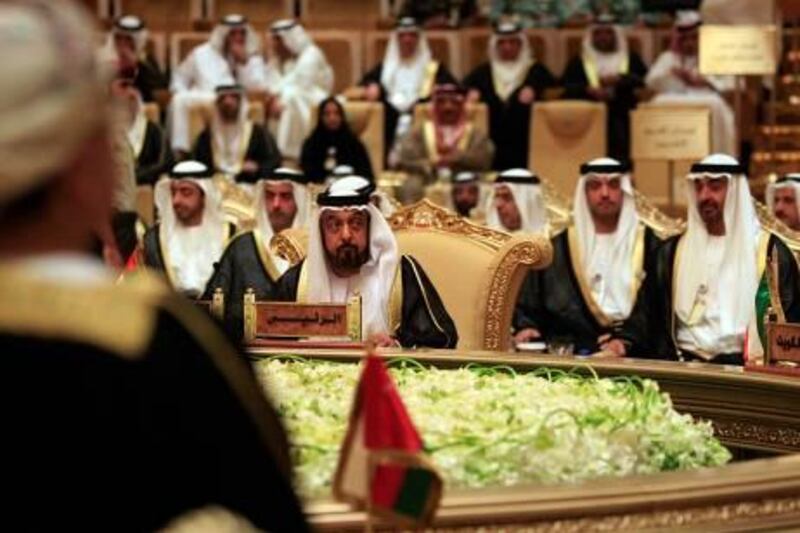ABU DHABI // Security dominated the agenda on day one of the two-day GCC summit in the capital yesterday as Gulf leaders considered the duel threats of the proliferation of terrorism and a nuclear-armed Iran, among other issues.
The GCC called for a peaceful resolution to Iran's nuclear stand-off with the West. The emir of Kuwait, Sheikh Sabah al Ahmed Al Jaber, said the security and stability of the Gulf depended on the nuclear crisis between the West and Iran being resolved "in a peaceful way".
The leaders also urged the Islamic Republic to adopt a dialogue with the UAE over the territorially disputed three islands of Abu Musa, and Greater and Lesser Tunb.
On the sidelines of the summit, Sultan al Suwaidi, the Governor of the Central Bank, said the UAE would implement the UN sanctions against Iran that were passed in June, but not unilateral ones such as those issued by the US or the European Union.
The spread of al Qa'eda was also a top item of concern for the leaders gathered at Emirates Palace for the 31st Gulf Co-operation Council summit, which was inaugurated by Sheikh Khalifa, the President of the UAE.
The Arab chiefs vowed to "stand with the international community in fighting terrorism". Sheikh Sabah made a particularly barbed reference to the fear spread by al Qa'eda in the region, condemning terrorist plots that he said were aimedto "murder innocents, spread destruction and halt development".
Analysts have warned that Gulf countries faced a range of threats, including internal ones to the stability of their regimes. Sheikh Sabah praised Saudi Arabia's arrests of 149 terrorists suspected al Qa'eda members on Friday. "We express our strong disapproval of terrorism to acts like this, and we stand by Saudi Arabia and the international community in fighting against terrorism in all its forms," he said.
On other foreign policy issues, the leaders blamed Israel for stalling peace negotiations with Palestinian leaders by refusing to halt the building of Jewish settlements.
The GCC called on "particularly the United States as the caretaker of the peace process" and the international community to pressure Israel, to enable a "just peace" in the Middle East.
The summit congratulated Iraqi leaders for its moves towards a new government and expressed the hope that one would be formed quickly to implement peace and stability in the country.






